Table of Contents
This Book is Dedicated With Love and Gratitude To
Stuart, My Soulmate and Guardian Angel,
Who Makes Everything Possible,
and
To the Memory of My Mother, Ismene,
My Brother George,
My Grandparents,
and My Beloved Friend Joanna Bardis.
Acknowledgments
I am grateful to everyone at Avery Publishing Group for producing Secrets of Fat-Free Greek Cooking, with special thanks to Rudy Shur, for providing me with the opportunity to write this book, and to Joanne Abrams and Marie Caratozzolo, for their encouragement and professional guidance.
I also wish to extend my gratitude and appreciation to my entire family for their love, patience, and support. With special thanks to my father, Reverend Angelo Gavalas, for his wise counsel, for always encouraging the pursuit of knowledge and excellence, and for teaching me,
o, o o

. (Those who bear the torch, pass it to others.) I also wish to thank my Uncle, Arthur Vozeolas, for being a brilliant mentor.
And to my beloved friends for their love and faith in me, I am forever grateful: Annie, Lori, Ruby, J-Boy, Keith, and all the others who bless me with their friendship. I wish to extend my deepest gratitude to Abraham Matus, for his wisdom and guidance when I needed it the most. Special thanks also to my dear friend and legal advisor, Jeffrey Izzo.
This book would not have been possible without the help and creative input from my husband, Stuart Katz, the finest writer and teacher I know. I thank him for always having the patience to offer his expertise towards my creative efforts. I am so grateful for our love and friendship.
Finally, endless thanks to you, dear reader and cook. I pass the torch to you.
Introduction
The Greek passion for food and living is legendary. Greece, the magical land of glorious myths and noble heroes, has given us its priceless art, architecture, and philosophy. It has also provided us with Greek cuisine of great distinction rooted in the fundamental principles of cooking. The ancient art of Greek cooking has a purity and simplicity that has remained practically unchanged throughout the centuries.
I have enjoyed many of these recipes my entire life. I first learned to cook traditional Greek foods by watching my mother and grandmothers follow recipes that were handed down from previous generations. As an exercise and nutrition specialist, I have shared these recipes, for their deliciously wholesome and heart-healthy values, with colleagues and patients. My recipes are derived from traditional Greek rural cuisine, and I have carefully chosen vegetarian, fish, and meat dishes that are naturally low in fat or fat-free. In some cases, I have modified the original recipe to lower the fat content while retaining the robust flavors and zest. The Greek culinary lifestyle includes mostly vegetarian and fish dishesingredients that are readily available to them.
Recently, science has discovered that the Greek Mediterranean people have the lowest rates of diet-linked disease and the longest life expectancy in the world. Health professionals now recognize that traditional Greek rural cooking is the perfect antidote to the American high-fat and high-calorie diet.
Perhaps the Greeks, who follow the two golden rules of Pericles, have the right idea: In all things, moderation is best and Know thyself. It is this balance and harmony in life that is the Greek ideal, and it is reflected in their art, lifestyle, and cooking.
I invite you to share with me an ancient inheritance inspired by legendary gods and noble heroes, the glories of ancient Greece, and the timeless Greek cuisine, which have as much relevance in our lives today as they did millenniums ago.
Nectar of the Gods
Mastering Fat-Free Greek Cooking
In addition to giving the world superlative architecture, literature, philosophy, and mythology, the Greeks have also given us the fine art of cooking. Thousands of years ago, the ancient Greeks elevated cooking to an art form and provided the world with its first chefs. Food was such an important and integral aspect of Greek daily life, even the great philosopher Plato debated on how fish should be prepared.
Authentic Greek cuisine has not changed much since the time of the ancient Greeks. Feasting on this fine cuisine provides a timeless link to legendary gods and noble heroes. Traditional Greek rural cooking is naturally low in fat, using simple wholesome ingredients, fresh vegetables, and little meat and oil.
In this chapter, you will be introduced to a variety of products to help you create low-fat, mouth-watering Greek delights. You will also learn the importance of reducing dietary fat and will be given guidelines to help assist you in budgeting your daily fat intake. In addition, you will find a glossary of wondrous Greek ingredients to use in your low-fat and fat-free Greek-style dishes.
REASONS TO FIGHT FAT
There are many excellent reasons to fight fat; the most common being the desire to lose weight. Reducing your daily fat intake is a good way to achieve this goal because fat is a concentrated source of calories, with more than twice the calories of carbohydrates or protein. If you compare a cup of olive oil (pure fat) with a cup of flour (almost pure carbohydrates), youll see that olive oil has over 1,900 calories while flour has only 400 calories. Its obvious that most of our calories come from fat.
When eaten in excess, fat is readily converted into body fat. Excess carbohydrates are also stored as fat, but the physiological process that converts carbohydrates burns up some of them. This means that a high-fat diet will create a weight gain that is 20 percent higher than a high-carbohydrate diet, even though both contain the same amount of calories. A high-fat diet is a double-edged swordits high in calories and is the kind of nutrient most readily stored as body fat.
An even more important reason to fight fat is for the prevention of diseases such as diabetes, heart disease, and high blood pressure. And different types of fatsaturated, polyunsaturated, and hydrogenatedpresent their own unique problems. Saturated fat, which is found in meat, butter, cheese, and margarine, has been found to raise blood cholesterol levels, increasing the risk of heart disease. Excessive amounts of polyunsaturated fat, found in vegetable oils such as corn, sunflower, and safflower, can contribute to heart disease and cancer.
Hydrogenated fats, such as margarine, are made by adding hydrogen to liquid vegetable oils, making the liquid oils more solid. This extends the products shelf life and improves its baking and cooking qualities. Unfortunately, the hydrogenation process also transforms the oils into trans fats, which act very much like saturated fats. Trans fats raise levels of LDLs (low-density lipoproteins), or bad cholesterol, and lower levels of HDLs (high-density lipoproteins), or good cholesterol.
Monounsaturated fats, found in olive oil, canola oil, avocados, and nuts, have no known harmful effects, other than being a high source of calories, like all fats. However, olive oil has been found to bestow some health benefits that include reducing the LDLs while maintaining the HDLs. Olive oil has also been found to give protection against tumor development, while reducing the risk of contracting breast cancer. Although olive oil is not a cure-all, it has been shown to be beneficial when used in moderation, and is an integral part of Greek cooking.


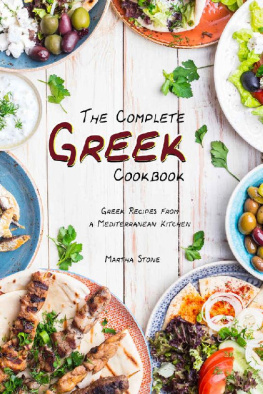
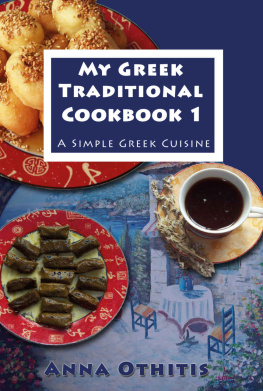
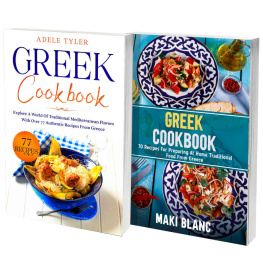
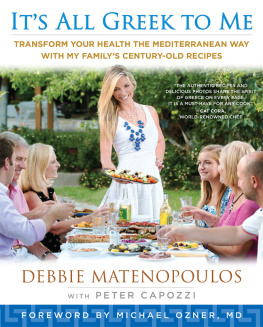
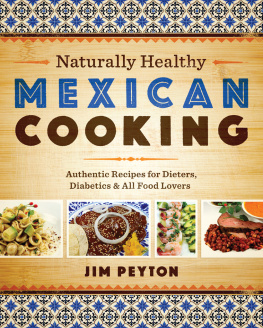
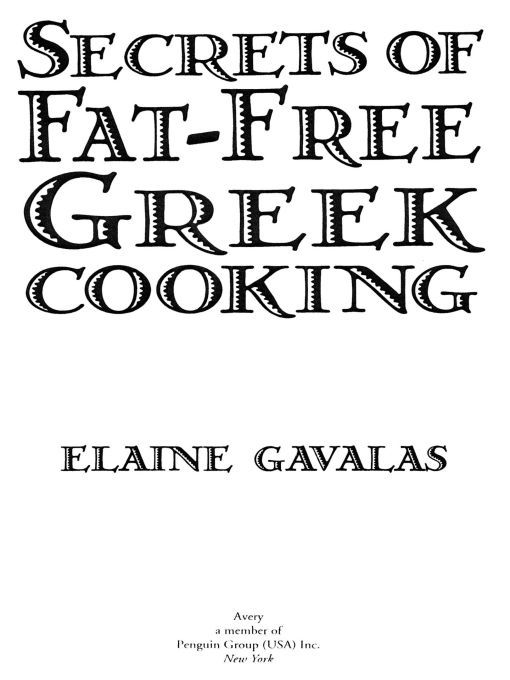
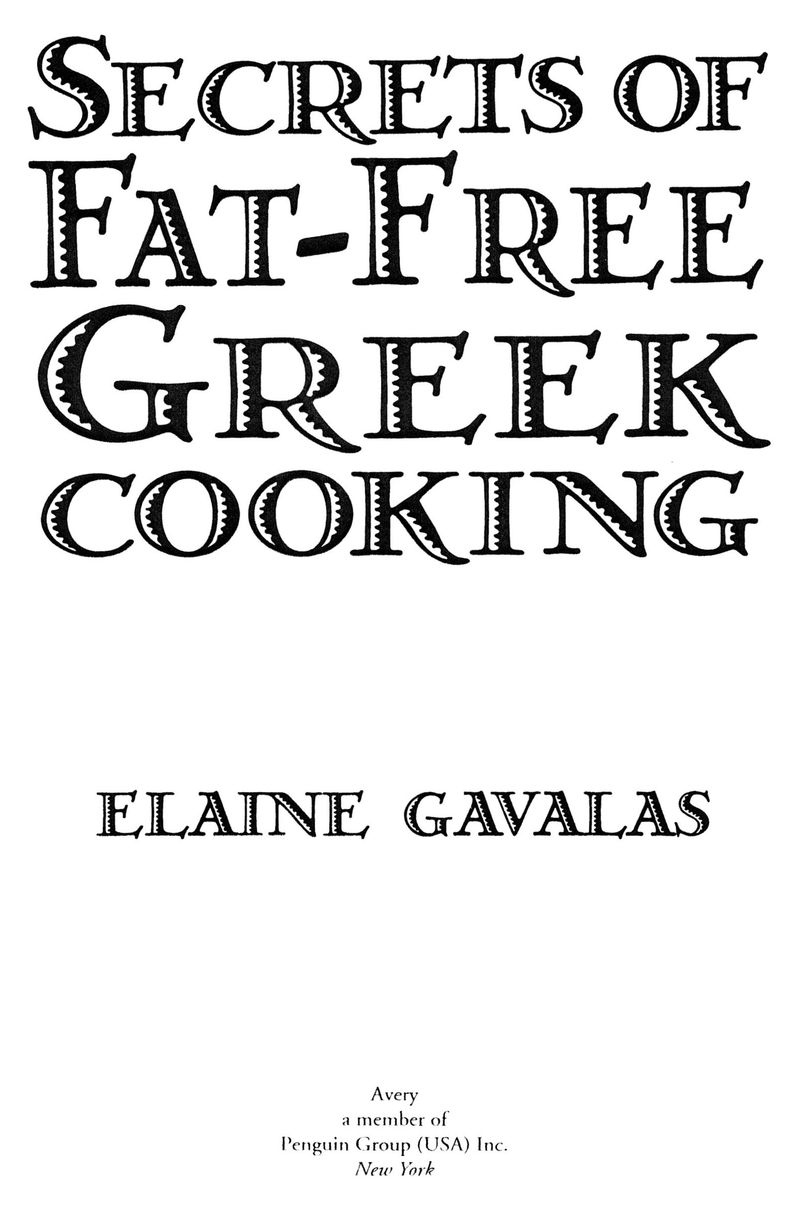
 . (Those who bear the torch, pass it to others.) I also wish to thank my Uncle, Arthur Vozeolas, for being a brilliant mentor.
. (Those who bear the torch, pass it to others.) I also wish to thank my Uncle, Arthur Vozeolas, for being a brilliant mentor.